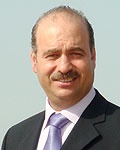Professor Nidal Hilal
The PhysOrg article Bacteria and nanofilters — the future of clean water technology said
“Bacteria often get bad press, with those found in water often linked to illness and disease. But researchers at The University of Nottingham are using these tiny organisms alongside the very latest membrane filtration techniques to improve and refine water cleaning technology. These one-celled organisms eat the contaminants present in water — whether it is being treated prior to industrial use or even for drinking — in a process called bioremediation.The water is then filtered through porous membranes, which function like a sieve. However, the holes in these sieves are microscopic, and some are so small they can only be seen at the nanoscale. Pore size in these filters can range from ten microns — ten thousandths of a millimeter — to one nanometer — a millionth of a millimeter.
These technologies can be developed into processes which optimize the use of water — whether in an industrial system or to provide drinking water in areas where it is a scarce resource.
The research is led by Nidal Hilal, Professor of Chemical and Process Engineering in the Centre for Clean Water Technologies — a world-leading research centre developing advanced technologies in water treatment.”
Nidal Hilal, BEng (Homs), MSc (Wales), PhD (Wales), DSc (Wales), Eur Ing, CEng, FIChemE is Professor of Nano-membranology and Water Technologies, School of Engineering, Swansea University, UK.
Nidal’s current research activity focuses on water treatment, novel membrane separation processes, membrane nanotechnology, and the application of atomic force microscopy (AFM) to chemical and process engineering. He is now internationally recognized as a world-leader in developing and applying the force measurement capability of AFM to the study of membrane surfaces.
His research has produced several breakthrough innovations, including the development of novel membranes; the smallest AFM colloid probe reported in the literature; the first AFM coated colloid probe technique; the first AFM cell probe technique; the first direct measurements of the interaction of single live cells with surfaces; the first use of the atomic force microscope in meso-scale cavitation studies. His most recent scientific breakthrough has been the development of a ground-breaking AFM-HSMP technique that combines AFM force-distance measurements with ultra-high speed micrography to study rheology and extensional fluid properties. All these techniques/technologies have widespread applications in process optimization and the development of novel processes.
He has also been highly active in finding multidisciplinary, collaborative applications of atomic force microscopy and process engineering. For example, current projects range from rheology of colloidal suspensions and superspreading with nano-scale interactions to fabrication of re-usable materials based on mineral particulates. This approach has been highly successful in attracting both significant funding from EPSRC and industrial interest.
Nidal has published around 200 articles in the refereed scientific literature. His work has also been published widely in highly reputable journals, refereed international conference proceedings, and invited book chapters. The coauthors on many of his publications reflect the strong international links which he has established.
He coauthored Characterization of nanofiltration membranes for predictive purposes — use of salts, uncharged solutes and atomic force microscopy, Atomic force microscope studies of membranes: Surface pore structures of Cyclopore and Anopore membranes, Analysis and Evaluation of the Liquid-Liquid Equilibrium Data of the Extraction of Aromatics from Hydrocarbons by Tetraethylene Glycol, Direct measurement of the force of adhesion of a single biological cell using an atomic force microscope, An atomic force microscopy study of the adhesion of a silica sphere to a silica surface — effects of surface cleaning, and The effects of electrostatic interactions on the rejection of colloids by membrane pores — visualization and quantification. Read the full list of his publications!
Nidal has been the co-chairman of a pioneering international research event at the University of Oxford on Water and Membranes. He has also been invited to act as a member of the scientific committees in international conferences and delivered a numerous number of invited lectures around the world. He has made major contributions to discussion panels on global water issues and desalination for a number of science programmes including Home Planet and The Material World for BBC radio 4. He is also a member of editorial board for the Desalination journal, a member of the project advisory board of the Middle East Desalination Centre, on the panel of referees for the Research Councils in the UK, Canada, Finland, and Norway and for more than 40 international journals.
Nidal has been the Director of the Centre for Clean Water Technologies in SChEME since 2003. This centre is internationally recognized for research into potable and waste-water treatment technologies, including desalination, advanced oxidation, membranes, and colloid and interface-based technologies.
He has been awarded the Doctor of Science Degree (DSc) from the University of Wales in 2005, in recognition of an outstanding research contribution in the field of Scanning Probe Microscopy and Membrane Science and Technology.
The world-leading reputation for research that Nidal has earned in the fields of membrane technology and water treatment have now been formally recognized by the award of the prestigious Kuwait Prize of Applied Science for Water Resources Development for the year 2005. This has been awarded by the Kuwait Foundation for the Advancement of Sciences (KFAS). This prize is one of the highest scientific honors which are awarded in the Middle East for intellectual achievement. This is the first time that the award has been made to an academic in a UK university.
Nidal earned his DSc, PhD, and Masters degrees in Chemical Engineering from the University of Wales, UK and his Bachelors degree in Chemical Engineering at Homs, Syria. He is a Chartered Engineer, a Fellow of the Institute of Chemical Engineers, a member of the European Desalination Society and a member of the European Membrane Society.
